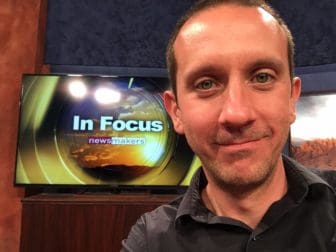COMMENTARY: Dehumanizing rhetoric, like President Donald Trump’s recent labeling of MS-13 gang members as animals, is a concerning move toward more explicit persecution of entire groups of people.
We’ve been here before. Our U.S. government, and in New Mexico the Spanish before it, dehumanized Native Americans by calling them savages, then treated them as lesser beings to rape, rob, displace and murder.
We enslaved people from Africa we viewed as animals. We put Japanese Americans in concentration camps during World War II. We called Mexicans dogs, and the U.S. Supreme Court has upheld racial profiling by law enforcement of people who look like they “live in Mexico” as long as that’s not the sole reason for stopping a vehicle – a practice that quite literally meets the definition of institutional racism.

Heath Haussamen
So Trump’s degrading comments about people of certain racial and religious groups are alarming. Last week he said of MS-13 gang members, “These aren’t people. These are animals.” He’s also called Mexican immigrants rapists and murderers.
And he’s questioned why people come to the United States from “shithole countries” – El Salvador, Haiti and some African nations.
Trump quickly calls out Islamic terrorism. He’s slower – or silent – when the perpetrator is white. He pledged during his campaign to ban Muslims from entering the United States.
Society is full of museums, monuments and history books to teach us about our worst moments so we never repeat them. The Holocaust Memorial Museum in Washington, D.C. is a place that silences me. I feel as though I’m walking on corpses. I breathe more slowly and ponder the horror of genocide.
Every person and society makes mistakes. We’re supposed to learn from them. We’re supposed to evolve.
Today, Trump isn’t the problem. He’s a symptom of a societal cancer.
That cancer is evident in the fact that some (not all) people who voted for Trump support his dehumanization of others. It’s evident in people who tolerate Trump’s rhetoric even if they don’t agree.
It’s also revealed in how some folks support oppressive systems when their political party is in power but oppose them when it’s not.
Many who were silent when former President Barack Obama decided to continue to allow racial profiling in the enforcement of immigration law are now outraged that a Trump-era Border Patrol agent detained two American women for speaking Spanish. Many who took no issue with Obama building a massive fence on the border in Southern New Mexico are protesting Trump’s extending the same fence.
Meanwhile, the cancer is spreading. The dehumanization of people is becoming more explicit.
Even violent MS-13 gang members are humans. They were born into circumstances that have contributed to them becoming who they are. The United States has often played a role in the oppression of people in Latin America. Children form beliefs about the world in part from our colonizing role in their home nations.
In other words, the world is complicated. The lesson we must learn from our mistakes is that seeing and treating all people as human beings is a critical step toward creating a more just and equitable world.
Being consistent about fighting for justice, regardless of which political party is in power, is also critical.
Trump’s rhetoric is hardly the first or only warning that the United States is headed down a dangerous road. I hope it serves as a wake-up call, and that the energy to fight for equity continues regardless of which party is in control.
Heath Haussamen is NMPolitics.net’s editor and publisher. Agree with his opinion? Disagree? NMPolitics.net welcomes your views. Learn about submitting your own commentary here.

